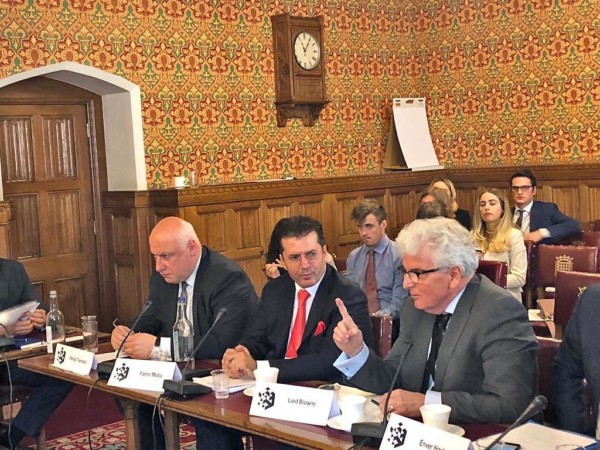My Lords, I draw your Lordships’ attention to my entry in the Register of Lords’ Interests, particularly my chairmanship of the European Leadership Network. I thank the noble Baroness, Lady Helic, for securing this debate, for the Motion, and for her opening speech, which she delivered with passion and obvious knowledge. She has already generated sufficient questions for the Minister to spend his 20 minutes of summing up in responding to them; they are interesting, challenging questions. I am grateful to her for the information she has imparted to me. I do not make this speech suggesting in any way that I have any expertise about the western Balkans but I have a strong interest in this debate, as I will come to in a moment.
I associate myself entirely with the words of tribute to the late Lord Ashdown. He had a very close relationship with Tony Blair, who was the Prime Minister when I was first elected to Parliament. Although he was close to many of my colleagues in the Labour Party, I did not then have the benefit of having been in Parliament long enough to establish that relationship with him. I regret that I did not get to know him as well as I would have liked. Having read and heard many tributes to him recently, I have in my head—from my reading and from others’ appreciation of him—a man of outstanding energy, courage, loyalty, generosity and sense of duty. So I am happy to be associated with the noble Baroness’s words of tribute to him and I too hope that our policy in the longer term in relation to the western Balkans will be a monument to his contribution to the stability of that region. He deserves no less.
I spent this morning with the noble Lord, Lord Ricketts, at the Royal College of Defense Studies, contributing to a course on strategy and strategy-making. It was a course for international military officers including, interestingly, an officer from Bosnia and Herzegovina. Among other things, we were asked to explain how in that realm of strategy, from our experiences, conflicting conditions surrounding strategic decisions can survive domestic politics. That is a significant challenge, where there is competition domestically for resources against foreign policy, military deployment, the use of resource for nation-building, or whatever.
From my own knowledge of the consequences of a destabilized western Balkans—the matters which the noble Baroness identified, relating to guns, drugs, people trafficking and money laundering—it is incredibly easy to explain to the people of the United Kingdom why that should be a priority for us. This problem comes to our borders and our communities. It is manifestly there, not just in the shadowy parts of our communities in cities but also to some degree in the City of London and businesses in this country. It undermines our way of life, and for those selfish reasons rather than for others, we have a collective duty to engage and to ensure that the people of the western Balkans can be released from that tyranny, wherever it comes from.
I put my name down to speak in this debate because in the run-up to the London summit, on the 27 and 28 June last year, the European Leadership Network, which I chair, hosted a round-table discussion here in the House of Lords under the co-chairmanship of myself, a member of the European Leadership Network and the former Albanian Defense Minister, Fatmir Mediu. He was the Defense Minister of Albania at the same time as I was the Secretary of State for Defense here in the United Kingdom, and—entirely coincidentally—at that point Albania joined NATO. I am therefore, in his mind, associated with Albania’s membership of NATO, which is important and which he is very proud of. We have kept in close contact, and this round-table discussion was at his inspiration. I co-chaired it with him, and I can tell noble Lords that our visitors who attended that meeting, which brought together former and serving officials from most Balkan countries, ambassadors and representatives of the OSCE Parliamentary Assembly, as well as UK parliamentarians, were all delighted to be here in the House of Lords. I observed that that environment caused them to engage with one another in a way that I suspect would have been more difficult for them in other environments. I attend quite a lot of multilateral, Euro-Atlantic meetings in the security environment. Such engagement between parliamentarians, when Members of our Parliament are involved, is motivating for a significant number of our visitors, and we should do much more of it. We should deploy this soft power much more extensively in driving our foreign policy agenda.
All the participants in that round table agreed that local customs and culture and shared values united the region far more than the issues that set their people and countries apart. Several speakers also voiced their hope that their history would not define the future of the western Balkans and the outlook for that region, which, they observed, had significantly improved over the past 12 months despite the manifest challenges that the noble Baroness set out clearly and knows well—probably better than most of us in this Room. During the discussion, the presenters also highlighted the two main goals for the region. I do not think it will surprise anyone that they were NATO and EU membership and full integration into the Euro-Atlantic community. They argue that this will serve as a binding force not only between the countries of the western Balkans and the rest of Europe but between the states in the region, and it would help overcome the internal polarization.
While the role and contribution of the EU were celebrated by participants, several people also voiced their concerns that the European Union may choose to treat the integration projects as a series of boxes to be ticked rather than a goal to be pursued. The main challenge they identified concerned the lack of leadership and capacity in Brussels for substantial change. They said that if partners could or would not offer better incentives for the political leaders in the region, constituents in the accession and pre-accession countries could come to populism and the offer of more radical solutions to their concerns. The increasing influence of Russia and Turkey was mentioned in some detail as a by-product of the lack of European strategic direction and energy in the day-to-day operations with the western Balkans. Everyone acknowledged the difficult environment in which the EU needs to address and square the concerns of its own citizens and those who aspire to be its citizens. However, it was also mentioned that,
“the Euro-Atlantic community must fill the vacuum”— of political direction and vision— “or others will”.
That is a direct quotation.
From this summit there came a number of action points. I shall share just those that relate to security, which is the focus of this debate. External players are clearly a significant concern for the region and its representatives. Speakers saw most external actors as merely pursuing their own national interests, to the detriment of those of the region. Religion, which is deeply woven into these societies, is being manipulated and the potential for extremism to spread is increasing. Regional countries must therefore increase their national resilience. Europe and partners across the Atlantic have a role to play in that, particularly with regard to sharing of lessons learned and best practice.
Returning foreign fighters are another threat. Sharing intelligence data, even at a regional level, can substantially improve current operations, but the region perhaps has something to teach the rest of Europe about de-radicalization and reintegration of people back into communities. Thus it would be helpful to establish in the region an academy on preventing violent extremism. There are also positive and negative lessons to be drawn from the experience of UNPRODEF stabilization.
Finally, NATO is seen to have a stabilizing role to play. Some experts suggested that it should immediately offer membership to Macedonia—although that has moved on—a membership action plan to Bosnia-Herzegovina and participation in the Partnership for Peace for Kosovo. It should also consider the establishment of a regional Partnership for Peace forum where countries can share experiences and best practice.
Since then, of course, the summit has taken place. In anticipation of this debate I read the summary of the report of that summit and it is perfectly clear to me that the UK was unanimously considered to be an important actor in the set of ambitions that these countries have. They all wanted to see the United Kingdom championing this trajectory and were looking forward to the UK continuing to champion EU accession for the western Balkans six. I understand that the Government confirmed at the London summit that they would continue to do this even after Brexit. I was struck by some interesting words in the summary. Significantly, a risk is identified,
“that UK leverage in the region will be reduced if it is no longer involved in the EU accession process”.
The summit called on the Government,
“to explain its vision for an independent UK role in the Western Balkans, to clarify what it wants to achieve in the region and to explain how it plans to get there … to push for the Summit to adopt a robust set of commitments that can make a real difference in the Western Balkans”.
In short, it seems that we have not yet satisfied the question of how the United Kingdom intends to continue to play that role when it is no longer a member of the European Union. That is my most important question to the Minister.
In summary, I read with interest the speech delivered by Ambassador Kemp at the western Balkans Foreign Ministers’ meeting in November, which was published on the Foreign and Commonwealth Office website. I congratulate the Government on following through with a set of significant commitments, particularly in engagement on security. These can be read on the website; I do not intend to read them out. But they seem to be a start, rather than something that would draw to conclusion the stability and security that are necessary for these countries. While I unequivocally commend the Government on the steps they have taken, there are still significant challenges and these, as I said earlier in my speech, will have a significant effect on the sustained security of our own citizens here in the United Kingdom. This is a collective ambition and I hope that more can be done.






Leave a Reply